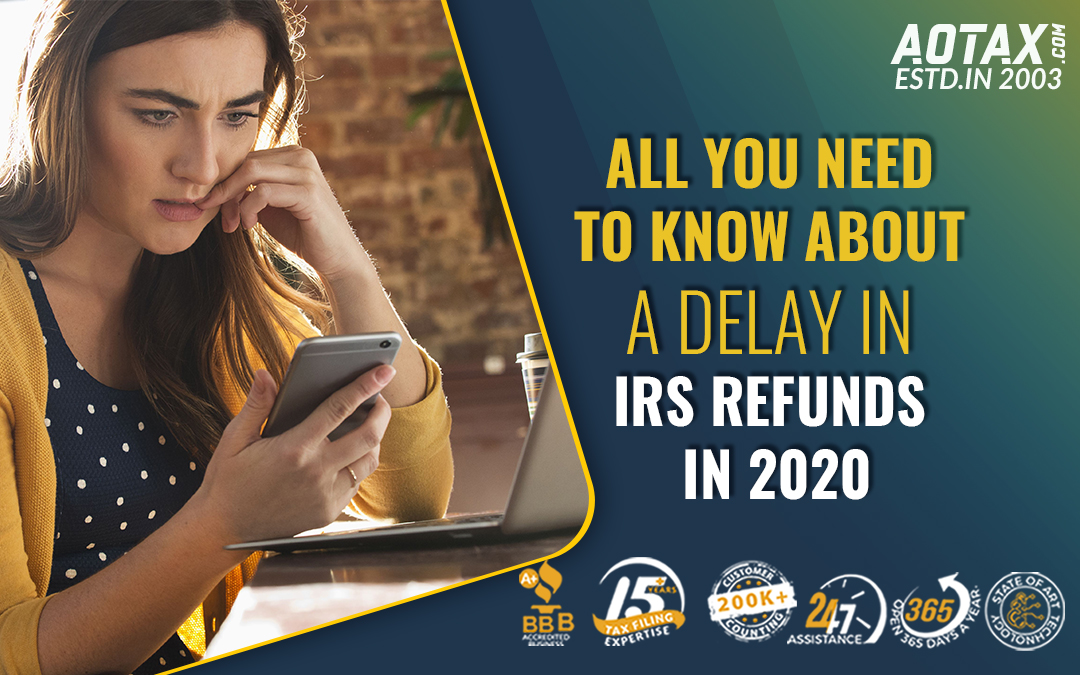
All you need to know about a delay in IRS Refunds in 2020
All you need to know about a delay in IRS Refunds in 2020
The US Treasury Department and the IRS had delayed the deadline for a federal tax return by three months to reduce the economic stress on the Americans caused due to the pandemic COVID-19. Due to the widespread impact of the novel coronavirus, the Federal Government has been urging the Americans to maintain social distancing. Due to the social distancing norms, the IRS had to close its offices around the country and operate with limited staff. Moreover, for around 2-3 months the IRS has been only performing the “Mission-Critical” functions which mainly included delivering Stimulus Checks to the Americans.
Many IRS officers have returned to offices last month to perform those tasks which cannot be performed from home. These tasks mainly include processing the federal income tax returns of the taxpayers and there is a huge backlog of work to be completed by the IRS officials.
How long does it take for the IRS to process tax refunds?
- Generally, the IRS would issue a tax refund to the taxpayers within 21 days of accepting the tax return request.
- If your return request has been filed electronically it would take the IRS maximum of 3 days to accept the request whereas if it is filed by the paper medium it would take additional 3 weeks to accept the request.
- Due to the pandemic COVID-19, return requests filed by paper have not been processed and there has been a huge backlog. If you have mailed your tax returns by 15th July 2020 then you must be prepared for the huge delay.
Major reasons for tax refund delay in 2020
Let us have a look at some of the major reasons for the delay in a tax refund for the year 2020.
Filing early or late – If you have filed your returns earlier, you would wait eagerly to receive your returns. However, the early filers might even have to wait for long. The IRS is still making certain changes into its processes and has a lot of backlog work to finish up due to the pandemic. The changes in processes can include updated security measures or any other process tweaks.
Claiming certain credits – Your tax returns might be delayed if you filed them early but have claimed certain credits like Earned Income Tax Credit or Additional Child Tax Credit. You can keep checking the status of your return on the “Where’s my refund tool” of the IRS.
Filing done by paper returns – This is one of the most common causes for your tax refunds being delayed. Tax returns filed by paper means would take a longer time for being processed and also for the issue of the refund too. Sending of checks through mail also opens up the possibilities of your check being lost or being sent to a wrong address. So, this would delay the entire refund process.
Outstanding debts – The IRS can also garnish your refunds if you had defaulted on a federal student loan, if you owe money for back taxes, if you owe money for child support or if you filed a joint return and your spouse has outstanding debts. By garnishment, the IRS can withhold money from you to put it towards some other task.
Security measures – The IRS maintains strict security measures to combat identity theft. There are some security measures due to which the IRS can increase its processing time. There might be a scenario where the IRS suspects that there has been a tax return filed for you by stealing your identity. This can delay your return and you might obtain it after the investigation has been completed by the IRS. Sometimes, the IRS may also feel that the bank account mentioned in the return is suspicious and does not belong to you; in this case, the IRS would send it to you as a paper check.
Incorrect bank information – Your account number and bank details should be correct while filing your tax returns. If you have entered the wrong information and the refund has not been sent by the IRS, you can call on the toll-free number and request to stop the processing. If the refund has already been sent by the IRS, then you can contact the financial institution to send the payment back to the IRS and the IRS would issue you the refund as a paper check. However, if the financial institution does not agree to send the refund back to the IRS you would have to file Form 3911.
Mistakes on your return – In case, there are any mistakes in your return such as any mathematical errors or incorrect personal information then the IRS would take a long time in processing them. This would slow down the process of a potential refund. The IRS would contact you for any mistakes in your return and in some cases, it might amend your minor errors as well.
Conclusion
So, if you have not received your tax refunds yet you can call the IRS or check the status of your refund on “Where’s my refund?” in the www.irs.gov/refunds webpage.
References
- https://www.cbsnews.com/news/tax-refund-delay-irs-backlog/
- https://smartasset.com/taxes/tax-refund-delay
- https://www.cnbc.com/2020/06/22/heres-why-you-havent-received-your-tax-refund.html
- https://www.washingtonpost.com/business/2020/07/21/tax-refund-delay-irs/
- https://www.wsj.com/articles/your-tax-refund-may-be-late-this-year-heres-why-11594810800

Recent Comments